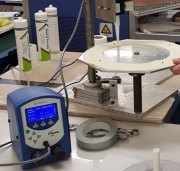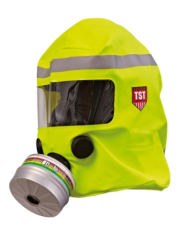 In this case study Techsil provided Speed Plastics with a flexible silicone adhesive and a fast, reliable, consistent dispensing solution in the manufacture of a Smoke Hood.
In this case study Techsil provided Speed Plastics with a flexible silicone adhesive and a fast, reliable, consistent dispensing solution in the manufacture of a Smoke Hood.
Speed Plastics Ltd specialise in high frequency welding of flexible plastics and also offer customers bespoke engineering solutions in sectors such as healthcare, aviation, defence and marine. Adhesive and dispensing specialists Techsil were approached to find a transparent flexible adhesive to bond the mouthpiece of a smoke hood and plan a new method of production.
A number of adhesives had been tried but under stress tests were too brittle for the substrates which were silicone rubber and cotton backed PVC. Furthermore the contours of the mouthpiece made applying the adhesive by hand very tricky. A 1-part flowable silicone adhesive was recommended by Steve Green, one of Techsil’s Application Development Engineers who explains, “Momentive IS5628E silicone adhesive cures at room temperature, requires no mixing and its flowable consistency makes it easy to apply. It adheres well to silicone rubbers and cures to make a tough durable bond which can withstand very high and low temperatures. Making it an ideal solution for this application.”
 For the production process, a semi-automated system was chosen. A circular, even bead of adhesive was required and a Nordson EFD Ultimus 1 dispenser with a 310 cartridge assembly was deployed and a fly press to deliver the adhesive. The hood and mouthpiece is placed on a turntable and is rotated 360 degrees during dispense.
For the production process, a semi-automated system was chosen. A circular, even bead of adhesive was required and a Nordson EFD Ultimus 1 dispenser with a 310 cartridge assembly was deployed and a fly press to deliver the adhesive. The hood and mouthpiece is placed on a turntable and is rotated 360 degrees during dispense.
Conclusion – This project has increased the speed of the manufacturing process. The Momentive IS5628E adhesive, produces a sound bond which is uniform and repeatable due to the automated dispensing. In addition adhesive wastage has been eliminated, which was an inevitability of hand application.
For further information please contact technical@techsil.co.uk
Full case Study can be accessed here: https://www.techsil.co.uk/media/wysiwyg/Blog-PDFs/Case-Studies/speed_plastics_case_study.pdf
